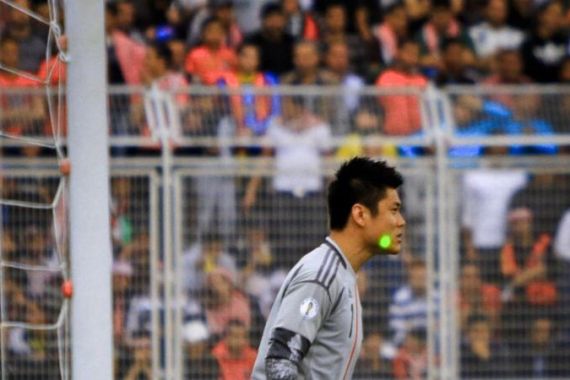Dirty tricks and the beautiful game
‘Bed football’, ‘grassrolling’ and lasers – tactics dogging Asian football are ruining the game, writes John Duerden.

Star Wars, the beautiful game and lying down – it sounds great in theory but laser beams and rolling around pretending to be injured get old pretty quickly. Blatant time-wasting has long been something that the big East Asian teams have had to deal with when playing western opposition, but these days, laser beams are often added into the mix.
In East Asia there is a word for it – ‘Bed Football’, the tendency of West Asian players to lie down and fall asleep for no apparent reason. One theory is that they have been stunned from the, usually green, lasers that increasingly emanate from crowds in and around the Gulf.
Keep reading
list of 4 itemsHolders Man City go out of Champions League on penalties to Real Madrid
Barca crash out as Mbappe brace leads PSG to Champions League last four
Saudi reviews football fan rules after whip attack
Running down the clock and the pointing of lasers are not confined to West Asia but the region has more than its far share of both. These days even Iran, where not long ago ‘grassrolling’ was looked down upon as the preserve of its Arabian neighbours, does it.
Just last week in Amman, Jordan fans created a passionate and intimidating atmosphere for a vital World Cup qualifier against Japan. Australia struggled with it and lost in September and the Samurai Blue then suffered the same fate. Few could grudge Jordan the win. This is a national team that has come on leaps and bounds in recent years.
The atmosphere wasn’t the only thing that got in the faces of the Japanese players. Lasers were pointed at Yasuhito Endo as he stepped up to take a penalty that was saved. “It wasn’t just the penalty, there were other times in the game, too, but it (the laser beam) didn’t really affect me,” the genial midfielder told Kyodo news agency.
“I was focused and tried to place the ball where I wanted to put it, but the goalkeeper read it.”
Salah Sabra, vice-president of the Jordan Football Association dismissed the complaints that were made to FIFA by the Japan FA.
“Personally, I am surprised at these accusations. We did not hear or notice anything about laser,” he told AFP.
“The Japanese players themselves did not complain during or after the match yesterday.” Sabra dismissed it as an attempt to excuse a defeat.
He should have reacted better. Whether Sabra believes the claims or not -and there are images of green beams shining into the eyes of Japanese players readily available for all to see, if their eyesight has not been permanently damaged by lasers – promising to look into the matter rather than dismissing it as a lame excuse would have been a more professional response.
Sour grapes
Whether it is possible for authorities to stop the practice is another issue but it is something that should be taken seriously.
As Sabra’s comments show, complaining invites a charge of sour grapes if you lose but it is not the first time. Japan saw green in Bahrain during qualification for the 2010 World Cup and in 2009 the Koreans faced the problem in Saudi Arabia and, most openly, in Lebanon in 2011 when a Beirut defeat cost then coach Cho Kwang-rae his job.
Australia has not been exempt either and were targeted in Kuwait in 2010 and Oman last year as goalkeeper Mark Schwarzer said at the time. “Every time we come here, the same thing happens,” he said.
“So I told the referee before the game that I was sure it was going to happen. He did not believe me because it was daylight. He got it in his face as well and so he recognised it.”
If Australia were surprised by lasers when it joined Asia in 2006, they also had no idea about the timewasting. Parts of West Asia have, in the words of a well-known coach from those parts who wanted to remain anonymous, taken it to another level in the search to gain an advantage.
“Football is such an important part of society in West Asian countries and results are everything,” he said.
|
“Players and coaches alike will try to take advantage of every possible moment to manage the tempo of a game and secure a result. Wasting time has become an art form and must be dealt with firmly by officials to ensure the integrity and quality of the game.“ – Anonymous West Asian coach |
“Players and coaches alike will try to take advantage of every possible moment to manage the tempo of a game and secure a result. Wasting time has become an art form and must be dealt with firmly by officials to ensure the integrity and quality of the game.”
That was the case last week when a Japanese referee played seven minutes of injury time in the game between South Korea and Qatar in Seoul, in the sixth of which, Korea scored the winner.
There was no sympathy for the Qatari coach and his post-match complaints of too much added time. Most of it was a direct result of his team’s attempts to eat up the minutes.
Ironically, if Qatar had spent more time trying to beat Korea instead of eat up the minutes, it was a game they could have won.
That is the whole point.
If recent results show anything they show that with passionate fans, good coaches and talented players then even the smaller West Asian nations can live with the continent’s best. The other stuff is no longer necessary, but then it never was.